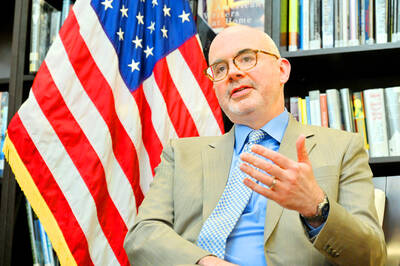The government has a four-year plan to save up to 2.5 gigawatts, or 15 billion kilowatt-hours of power by subsidizing the replacement of aging industrial equipment, and increasing household and commercial energy-saving efforts, Minister of Economic Affairs J.W. Kuo (郭智輝) said.
In an interview with the Chinese-language Liberty Times (the Taipei Times’ sister paper), Kuo discussed the nation’s nuclear power policies and pledged to enact measures to conserve power over four years.
Commenting on the imminent decommissioning of the first reactor of the Ma-anshan Nuclear Power Plant in Pingtung County on Saturday, he said that the Ministry of Economic Affairs was not the principal decisionmaking agency on nuclear power policy.

Photo: Lo Pei-de, Taipei Times
The ministry takes its cues from the Legislative Yuan and ensures that all actions comply with the law, he said.
“We will be ready” for the decommissioning, he added.
However, the ministry’s ability to increase power sources has been overestimated and more measures are needed to develop power savings, he said.
Opposition to the development of traditional electricity generating systems has grown, and if power generation is to keep up with the country’s economic growth, the nation would need to consider building a fourth or fifth liquefied natural gas terminal, he said.
The government’s progress in implementing green energy has “taken a minor setback,” Kuo said, adding that the ministry’s current strategy is to encourage the public to conserve energy.
The ministry is promoting a three-year program offering NT$5 billion (US$152.26 million) in loans for small and medium-sized enterprises (SMEs) to replace aging equipment with more environmentally friendly machinery, he said.
The life expectancy of equipment at SMEs and in traditional industries often exceeds 30 or 40 years, meaning older equipment still in use likely does not meet modern energy-saving standards, he said.
The program would later be expanded to industrial factories and private residences, he added.
The program is expected to conserve 6 billion kilowatt-hours by the end of next year, which would cover the loss in power generation caused by the decommissioning of Ma-anshan Nuclear Power Plant’s first reactor, Kuo said.
The government’s basic energy policies focus on sustainable provision, competitive power prices and improving power quality, he said.
The ministry aims to be as competitive as Japan and South Korea on power prices, but the focus now is on power quality, he said.
Taiwan Power Co (台電) is under tremendous pressure, facing issues of aging staff at the companies which it outsources to, as well as aging transformers and cables, he said.
Regarding new Taipei City Government policies that would lead to increased power usage, Kuo said he planned to meet with Taipei Mayor Chiang Wan-an (蔣萬安) to discuss the issue.
He said he hopes to enlist the mayor’s support in encouraging local communities to embrace the construction of new infrastructure and address power usage issues in the Songshan (松山), Neihu (內湖) and Nangang (南港) districts.

NATIONAL SECURITY: The Chinese influencer shared multiple videos on social media in which she claimed Taiwan is a part of China and supported its annexation Freedom of speech does not allow comments by Chinese residents in Taiwan that compromise national security or social stability, the nation’s top officials said yesterday, after the National Immigration Agency (NIA) revoked the residency permit of a Chinese influencer who published videos advocating China annexing Taiwan by force. Taiwan welcomes all foreigners to settle here and make families so long as they “love the land and people of Taiwan,” Premier Cho Jung-tai (卓榮泰) told lawmakers during a plenary session at the Legislative Yuan in Taipei. The public power of the government must be asserted when necessary and the Ministry of

CROSSED A LINE: While entertainers working in China have made pro-China statements before, this time it seriously affected the nation’s security and interests, a source said The Mainland Affairs Council (MAC) late on Saturday night condemned the comments of Taiwanese entertainers who reposted Chinese statements denigrating Taiwan’s sovereignty. The nation’s cross-strait affairs authority issued the statement after several Taiwanese entertainers, including Patty Hou (侯佩岑), Ouyang Nana (歐陽娜娜) and Michelle Chen (陳妍希), on Friday and Saturday shared on their respective Sina Weibo (微博) accounts a post by state broadcaster China Central Television. The post showed an image of a map of Taiwan along with the five stars of the Chinese flag, and the message: “Taiwan is never a country. It never was and never will be.” The post followed remarks

Proposed amendments would forbid the use of all personal electronic devices during school hours in high schools and below, starting from the next school year in August, the Ministry of Education said on Monday. The Regulations on the Use of Mobile Devices at Educational Facilities up to High Schools (高級中等以下學校校園行動載具使用原則) state that mobile devices — defined as mobile phones, laptops, tablets, smartwatches or other wearables — should be turned off at school. The changes would stipulate that use of such devices during class is forbidden, and the devices should be handed to a teacher or the school for safekeeping. The amendments also say

CONSISTENT COMMITMENT: The American Institute in Taiwan director said that the US would expand investment and trade relationships to make both nations more prosperous The US would not abandon its commitment to Taiwan, and would make Taiwan safer, stronger and more prosperous, American Institute in Taiwan Director Raymond Greene said. “The US’ commitment to Taiwan has been consistent over many administrations and over many years, and we will not abandon our commitment to Taiwan, including our opposition to any attempt to use force or coercion to change Taiwan’s status,” he said in an exclusive interview with the Liberty Times (the sister newspaper of the Taipei Times) on Friday last week, which was published in the Chinese-language newspaper yesterday. The US would double down on its efforts